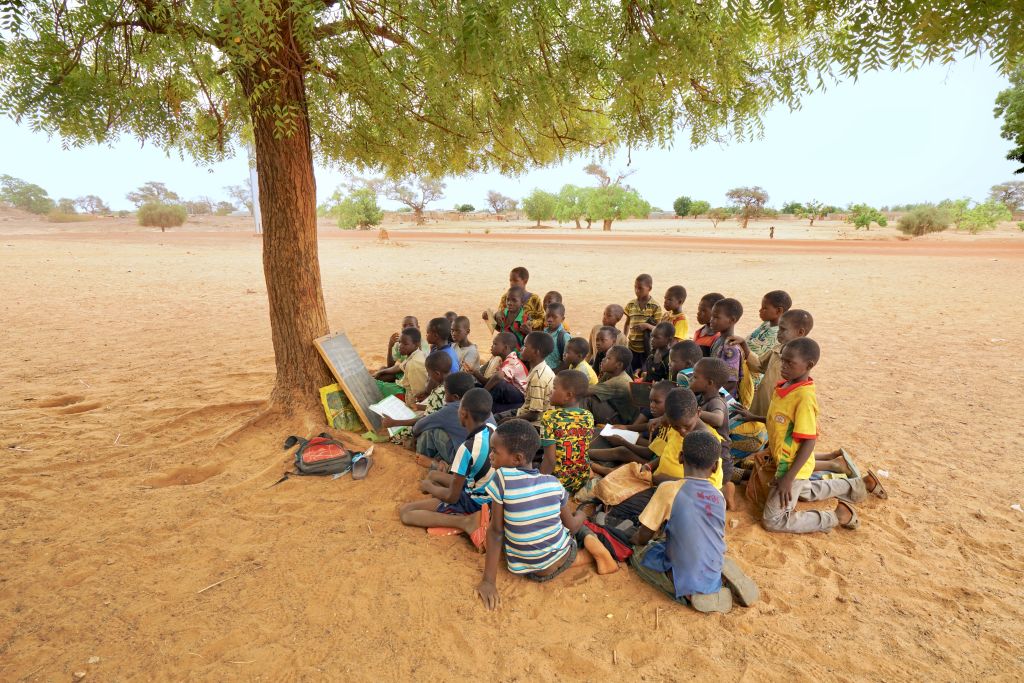ADF STAFF
Sometimes it starts with a violent threat written in graffiti on a school wall.
When heavily armed extremists arrive on motorcycles, the terror ensues — teachers are shot, kidnapped, raped. Some are executed in front of the children. School buildings are set on fire. Some are burned beyond repair.
Violent extremists in the Sahel have declared war on education. Their target is not just teachers and children but the fabric of society.
“Targeting schools is a key strategy for extremist militant groups, as schools are often the only symbol of the state’s presence in remote villages and teach values that are antithetical to extremists’ ideology,” data journalist Marie Toulemonde wrote in a May 4 article in The Africa Report magazine.
Between 2020 and 2021, more than 1,000 schools in Mali, Burkina Faso and Niger were targeted with armed raids by violent extremist organizations.
According to Toulemonde’s research, nearly 9,000 schools in the three countries have closed over the past four years (2019-2022), impacting more than 1.6 million children.
Burkina Faso has been hardest hit with almost half of closed schools in Central and West Africa.
School closures there are up 40% since the end of the last school year. One in four schools closed over the past four years, affecting more than 1 million children.
Since September 2022, at least eight teachers have been murdered, mostly in rural areas that are controlled by extremists.
In the blockaded town of Pama in the East region, only two out of eight schools are operational. Six teachers and a handful of volunteers serve more than 1,000 children in Pama.
“For those of us who are still here, it’s a very personal decision to stay,” one teacher told the Norwegian Refugee Council (NRC). “Education is a universal right, so we feel it’s our duty to carry on. But fear doesn’t go away easily.
“Often, we have to stop classes because we hear gunshots here or there. Threats loom large, and conditions are tough, but we can and must overcome challenges to assist children who never wished to be put in this situation.”
Hassane Hamadou, the NRC’s country director in Burkina Faso, said 31,000 teachers have been affected, including about 6,300 who have been moved to schools with large numbers of internally displaced students.
Even the good news is less than ideal, Hamadou said. While about 300 schools have reopened or relocated since January, Burkina Faso clearly is grappling with an education crisis.
“Only about a quarter of the children driven out of school have been given new classrooms,” he said in a statement. “The majority are left without access to education, robbing them of their childhood and of their chance to become independent adults and citizens.”
In Mali, one in five schools have closed. The U.N. says that 1,664 schools have closed over the last four years, leaving 500,000 students without an education.
More than 700 schools have closed in Niger, impacting nearly 75,000 children. Most are in the Tillabéri region adjacent to the Liptako-Gourma, or tri-border area between Niger, Mali and Burkina Faso, where Islamic State fighters maintain a strong presence.
School closures pose a devastating threat to the Sahel region, where UNICEF reported in 2020 that “more than 8 million children aged 6 to 14 [do not] attend school, i.e. nearly 55% of this age group.”
Experts say the danger of a lost generation in the Sahel is real, and even temporary dropouts have disastrous consequences on the future of the children and their country.
Not only does the destruction of schools exacerbate fundamental economic and structural problems, but it also is a key driver of recruitment for terror groups.
“As more and more children are deprived of an education, they are unable to study further to access stable and professional jobs, making them more vulnerable to being drawn into extremist groups,” Toulemonde wrote.
Rights groups like NRC are calling for urgent action.
“The longer this situation drags on, the graver it becomes, the harder it will be to reverse this trend and protect their futures,” Hamadou said.
“The authorities in Burkina Faso as well as humanitarian and development organizations must urgently renew their efforts to stop this educational hemorrhage.”

